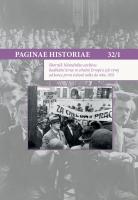Komunistické a sociálnědemokratické hnutí v Jihlavě v letech 1918–1933
The Communist and Social Democratic Movement in Jihlava in 1918–1933
Author(s): Radim GondaSubject(s): History, History of ideas, Local History / Microhistory, Recent History (1900 till today), Interwar Period (1920 - 1939), History of Communism
Published by: Národní archiv
Keywords: communism; social democratic policy; Jihlava
Summary/Abstract: Using the comparative method and the methodological tools of the theory of cleavages and critical junctures formulated by a political scientist Stein Rokkan, the text describes the development of social support for the Czech Social Democratic Workers' Party (ČSDSD), the German Social Democratic Workers' Party in the Czechoslovak Republic (DSAP) and the Communist Party of Czechoslovakia (KSČ) in the city of Jihlava in 1918-1933. The source of information for measuring social support for these parties is the results of municipal and parliamentary elections and official reports on public participation in the events organized by these political parties. The text is also devoted to assessing the conditions influencing social support for the studied political parties and to the description of their mutual relationships.The split in the two national social democratic parties led to their weakening and the emergence of a relevant communist party in the early 1920s. The ČSDSD managed to regain significant strength in Jihlava by the mid-1920s, winning more votes in municipal and parliamentary elections in Jihlava than the rival Communist Party, while at the level of the Czech lands and Czechoslovakia it was the Communist Party that received a higher support in the parliamentary elections of 1925. The ČSDSD held the position of the strongest left-wing party in Jihlava in all elections between 1925 and 1929. The DSAP received higher support than the ČSDSD in the 1920 municipal and parliamentary elections, but the split in the party and the competition with the Communist Party and the German nationalist parties weakened its social support significantly and in the long term.Although electoral support for the KSČ was lower in Jihlava than in the Czech lands and Czechoslovakia throughout the period under review, it nevertheless played a role in the party political system at the local level and brought a distinctive element to its functioning. In the sector of the Czech (Czechoslovak) political parties, the ČSDSD had an absolute majority in the 1920 parliamentary elections, while in the following elections the non-social democratic parties prevailed. The DSAP had a minority position in the German political parties sector throughout the whole period. Compared to the ČSDSD, the German Social Democrats gained significantly lower social support within the German political parties camp, with the marginal exception of the 1920 municipal elections, than their Czech colleagues within the sector of the Czech (Czechoslovak) political parties in Jihlava.
Journal: Paginae Historiae
- Issue Year: 32/2024
- Issue No: 1
- Page Range: 117-164
- Page Count: 48
- Language: Czech

